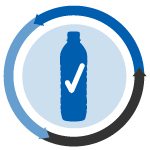
But that panel, which is called the Panel on Food Contact Materials, Enzymes, Flavourings and Processing Aids (CEF), refused to sign off on one recycling process, saying too little information was submitted for it to make a determination on the safety.
The CEF is part of the European Food Safety Authority (EFSA). In the European Union, recycled plastics and additives can only be used in food and beverage packaging if they’re first reviewed by EFSA for safety. Under EU law, recycling companies submit applications to individual countries, which apply to the EFSA on their behalf.
The following is a roundup of recent opinions from the CEF (previous entries were published in June).
PET recycling process
CEF said it saw no safety concerns with a PET recycling process based on Polymetrix (a former Buhler Group company) technology. The CEF opinion was published in July.
The review request came from the Greek government, which applied on behalf of Polisan Hellas S.A., Greece.
The technology aims to recycle PET food packaging into pellets for the molding of new food and drink packaging, typically bottles and thermoformed sheets. The new packaging is intended to be used for all kinds of foods for long-term storage at room temperature, with or without hotfill. The recycled content mainly comes from curbside and deposit beverage containers, although up to 5 percent may include non-food packaging such as soap bottles, mouthwash bottles and more.
The recycling process works as follows, according to the application:
The post-consumer containers are processed into hot caustic washed and dried flakes. Then, the flakes are melted and mixed with at least 67 percent virgin PET melt before it is all pelletized, crystallized and heated to the decontamination temperature (alternatively, the recycled PET is pelletized and then mixed with virgin pellets before they’re all crystallized and heated to the decontamination temperature). Finally, the crystallized and preheated pellets are decontaminated during solid-state polycondensation (SSP) in a continuous countercurrent reactor under high temperature and inert gas flow. The last step also boosts intrinsic viscosity of the material.
Lack of information
The CEF said another request submitted by the Greek government, specifically the Hellenic Republic Ministry of Finance, lacked information needed to give a proper review. That opinion was published in October.
The application, submitted on behalf of Pokas Arcadian Recycle Ltd. of Greece, asked the CEF to review a process for recycling PP or HDPE into food packaging. The proposed source of feedstock is PP or HDPE crates used to hold fruits and vegetables and PP and HDPE primary packaging. The material would be collected from food and packaging manufacturers and suppliers.
In the process, the incoming material is separated into three fractions: production scrap and used crates, primary packaging from the food packaging and processing industry and all other material coming from “an approved packaging management recycling system.”
The material is ground into flakes, washed, dried and extruded into granules. Those granules, which may or may not be mixed with virgin material, would then be used to mold new crates and packaging.
The request was rejected because too little detail was provided in terms of the feedstock and its source, the intended use of the recycled plastic and the recycling process steps. Additionally, the CEF questioned the results of the testing.
“Based on the information submitted to EFSA, the applicant has not demonstrated in a challenge test or by other appropriate evidence that the recycling process … is able to reduce any contamination of the PP and HDPE input to a concentration that does not pose a risk to human health,” according to the opinion.
Sunflower seed hull additives
CEF said it sees no safety concerns with a proposal to mix finely ground sunflower seed hulls into various plastics used in food packaging. Doing so boosts the plastic’s stiffness and tensile strength, according to the applicant. CEF’s decision was published in July.
The request was submitted by Germany’s Federal Office of Consumer Protection and Food Safety on behalf of a company called Golden Compound.
The proposal is to add the ground sunflower seed hulls as a filler in PP, PE, PVC, PLA or PS food packaging. The filler would be used at up to 50 percent, by weight.
“The additive is mixed with the polymer (most commonly PP) along with authorised antioxidants and processing aids, and then melt extruded into pellets,” according to the opinion.
The pellets are used to make products typically by injection molding or extrusion. The final packaging is intended for dry and solid foods only at room temperature or below for up to one month. The plastic containing the additives can be heated to up to 240 celsius (464 Fahrenheit).
The CEF said fatty acids can migrate from the plastic into the foods but saw no concern for it. That being said, CEF said, any migration of fatty acids should not affect the look, smell or taste of the food.